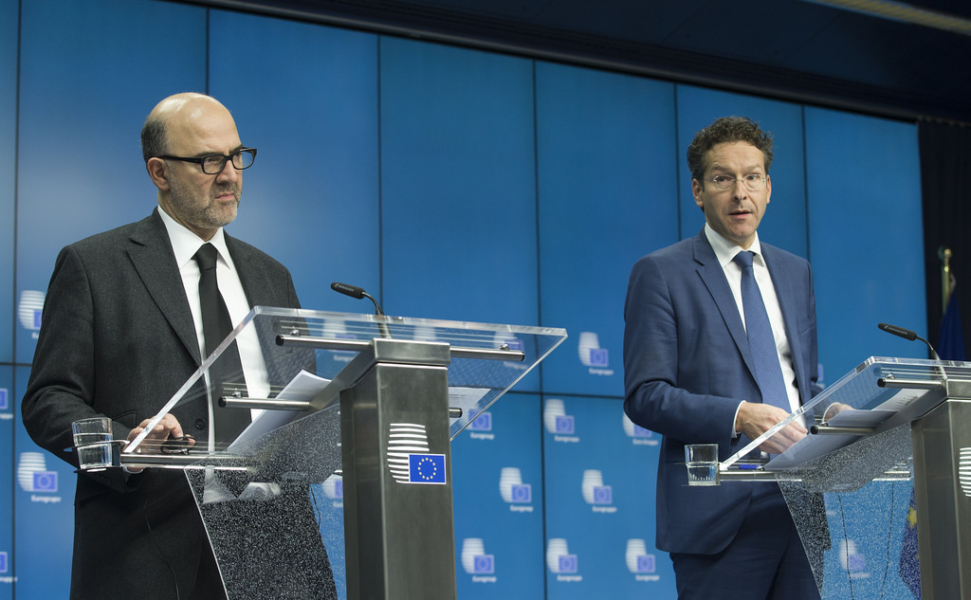At Transparency International EU, we are not shy to criticise the informal nature of the powerful Eurogroup and the lack of accountability that it brings to governing the currency most Europeans use. But there are advantages to its notorious lack of a formal structure: it can reinvent itself in no time. This may be happening, and the French appear to be leading the charge.
Following the election of Emmanuel Macron to France’s Presidency on a platform that specifically calls for the reform of the Eurozone’s institutional architecture, the project of deepening Economic and Monetary Union (EMU) has sprung back to life. The European Commission, which had been planning its reflection paper on EMU reform since 2015, immediately followed Macron’s ascendancy up with a litany of concrete proposals to deepen integration of economic and fiscal policies, and the stability-oriented neighbours across the Rhine are equally warming to the proposals.
But while the paper contains many proposals to reform EU economic governance institutions, such as a fiscal stabilisation capacity for the Eurozone, possibly including an unemployment benefits reinsurance scheme, European safe bonds, the completion of Banking Union, a regularised Eurogroup and expanded oversight powers for the European Parliament, another story gained a lot more traction in the media:
Is the French Commissioner Pierre Moscovici in the midst of a power-grab? In an interview with Politico’s Ryan Heath, and after having participated in over 80 Eurogroup meetings both as French finance minister and European Commissioner, Mr Moscovici makes it clear that the Eurogroup needs deep reform. He goes as far as stating that, had the Eurogroup been more open and more transparent, it would have taken “better” decisions. He also admits that he would like the role of Eurogroup President very much, and has for years been preparing for it – all while politely making it clear that only his successor is likely to benefit of these reforms and become an “EU Finance Minister”.
The idea is not new. Much like the “EU Foreign Minister” Federica Mogherini, the Commission wants a permanent President of the Eurogroup who would, at the same time, be a Vice-President of the European Commission. Currently the Eurogroup, which is composed of Eurozone finance ministers, chooses one of its own to preside over meetings, making the Eurogroup Presidency a non-remunerated but powerful side-gig. It makes sense to join up the Council and the Commission in a hybrid institution: While the Eurogroup is tasked mainly with executive functions, indicating this would normally be a job for the Commission, national budgets and economic policy go to the very heart of state sovereignty, just like foreign affairs. Member States will therefore want to be intimately involved, hence the hybrid construction. Indeed, the Eurogroup’s preparatory bodies are already housed in the Commission’s Directorate-General for Economic and Financial Affairs, DG ECFIN, unlike regular Council working groups.
At the same time, the Eurogroup’s executive nature means it needs to be held to account by a supranational parliamentary body, the European Parliament, because accountability should happen at the level at which decisions are effectively taken. A permanent Eurogroup President is better placed to be answerable to the European Parliament than a national finance minister who has neither the time nor the inclination to snub his national electorate in prioritising the European interest over national preference. The Commission is already accountable to Parliament, and would be well-placed to make the Eurogroup a more accountable forum.
Which brings us to the most important question: Is it even possible to make Mr Moscovici Eurogroup President? Yes and no. Protocol 14 annexed to the Lisbon Treaty is the legal basis attesting to the Eurogroup’s (informal) existence, but it only specifies that a President may be elected by a simple majority for a 2,5-year term. However, thanks to a vivid exchange of letters between the European Ombudsman Emily O’Reilly and the current Eurogroup President Jeroen Dijsserbloem, the Eurogroup followed the recommendation to finally publish its Eurogroup Working Methods, 10 years after they were adopted in 2007.
While these rules specify that candidates must “hold the position of national minister of finance”, thereby excluding Mr Moscovici, the working methods can be (and should be) adapted by the same simple majority required to elect a new President. Following the slow-motion debacle surrounding the electoral defeat and cultural missteps of the current Eurogroup President and acting Dutch finance minister, this may be an opportune moment.
Making the Eurogroup a properly accountable EU economic governance institution with the formal authority to take decisions requires full-blown treaty change. On the other hand, test-driving a hybrid arrangement that would be far more effective and at the same time more accountable than what is currently in place only requires a swift rule-change.
Mr Dijsselbloem’s mandate runs until January 2018; but if and when a new Dutch government takes office, the Eurogroup’s future will once again rely on its ability to spontaneously re-invent itself.






